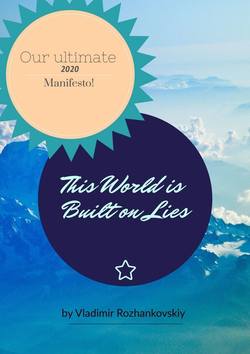Читать книгу This World is Built on Lies - Vladimir Rojankovski - Страница 8
This world is built on lies
ОглавлениеThey lie to us while saying “none of our troops are there”. They lie to us suggesting that the modest opioid use is safe and carrying personal guns is good to protect our lives and homes. They lie to us when they say there is a capitalist system and a “communist” system, whereas in reality it’s THEIR system as opposed to OUR system. They lie to us saying that not all countries are equally involved in using performance enhancing drugs among their Olympic Olympicetes. They lie to us when they say that electric cars kill the oil industry. They lie to us when they defend their own interests thousands of miles away calling them our national interests.
But even worse, they don’t simply lie, they want our engagement and endorsement of their lies. Having failed – partially or wholly – their internal agendas, they seek our approval and involvement in their external ones. Don’t they try to unify us (AKA “the voters”) around something that invariably won’t make our lives better?
Why is our typical headline news’ content so much focused on various sorts of propaganda, starting with international politics and ending with the mere advertisement urging us to buy some unnecessary items? Of course, in the era of smart TVs we are free to build the watch content by ourselves. However, no matter how hard we try to shift our priorities, in general circumstances like a job interview, or just visiting a friend’s party, all conversations usually start with either discussing various boring household topics or what our politicians have done recently “to fight our enemies”.
People prefer negative news to positive news, as well as fake and conspiracy content to dry description content – this was one of the takeaways of Morgan Stanley analyst and venture capital investor Mary Meeker in her annual report called “Internet trends 2019”.
There are several reasons why users tend to read fictional news and immerse themselves in conspiracy theories.
Social networks catalyze the distribution of “sizzling” content. Sometimes it’s easier and more interesting to get the news about, let’s say, Donald Trump’s jump in blood sugar levels than it is that the Federal Reserve System has changed its key interest rate. An average reader is unlikely to take time diving into the story about the Fed, although potentially it affects him or her more profoundly than the above-exemplified news about Trump’s health.
As a result, struggling for readers’ attention, news producers more and more migrate into a quasi-entertainment format, thereby losing objectivity and credibility. Fact-checking doesn’t matter because it doesn’t sell well anyway.
Most of us view the news as entertainment while lacking media literacy and expert knowledge. We are not used to reading between the lines, let alone looking for useful information in the news – we are just thirsty for sensations not always having time for a thorough review of what we consume and repost. Readers en-masse do not distinguish between info-noise and important news, which is usually more boring.
People want easy explanations of how the world works and the reason for what is happening to them. Given this, various conspiracy theories accommodating aliens, fortune, fate and the “world evil”– provide the most unconditional answers to all, and for this reason graciously kill anything boringly factual.
In this kind of environment there is a growing deficiency of a positive agenda. On top of that, doesn’t it look strange that the politicians and various actors seek our sympathy in their professional affairs inflating the importance of what they do for a living, at the expense of scientists, doctors, builders, writers, real estate agents and others who are not given similar opportunities to share the importance of what they do?
My sad contemplation isn’t anything unique. Many blockbuster authors, at Amazon.com and beyond, raise the alarm of the extreme culmination of corruption, intolerance and mutual hatred lately. Thus, Peter Schweizer has been writing about partiality and corruption for years. There is a growing number of international authors who urge us to leave our comfort zones and identify our real, rather than imaginary, enemies – in order to start building a better future for our children.
The beauty of building new, positive, agendas is that the more people get involved in producing various clickable YouTube (and the likes) content the higher the chance that it will finally become real headline news for the hundred million watchers worldwide. Opportunity to get involved in various professional networks gives us clear added value of shifting our content from one that is very emotionally impactful, but equally disengaging, to one where we can be more proactive and efficient and, hence, satisfied.
In other words, we are in desperate need to become in charge of our own SEO (Search Engine Optimization), and since we live in a modern, highly interconnected and self-replicating, world, we are able to reclaim the right to live our own lives, rather than the lives of those who we see on our TVs.
